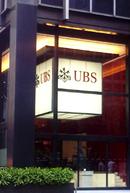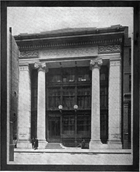- Kidder, Peabody & Co.
-
Kidder, Peabody & Co. Former type Subsidiary (Inactive) of UBS AG Industry Investment banking Fate Acquired by Paine Webber Founded 1865 Defunct 1994 Headquarters Boston, Massachusetts, United States Products Financial Services Kidder, Peabody & Co. was a U.S.-based securities firm, established in Massachusetts in 1865. Its operations included investment banking, brokerage, and trading.
The Firm was sold to the General Electric Corporation in 1986 and following heavy losses was subsequently sold to PaineWebber in 1994. After the acquisition by PaineWebber, the Kidder, Peabody name was dropped, ending the firm's 130 year presence on Wall Street.[1] In November 2000, PaineWebber itself was merged with UBS AG.
Contents
History
Early history
Kidder, Peabody & Co. was established in April 1865 by Henry P. Kidder, Francis H. Peabody, and Oliver W. Peabody. The firm was formed through a reorganization of its predecessor company, J.E. Thayer & Brother, where the three founding partners had previously worked as clerks.
Kidder, Peabody acted as a commercial bank, investment bank, and merchant bank. The firm had an active securities business, dealing in treasury bonds and municipal bonds, as well as corporate bonds and stocks. Kidder also actively traded and invested in securities for its own account.
In the aftermath of the 1929 stock market crash, Kidder Peabody was in a perilous situation. In 1931, Albert H. Gordon bought the struggling firm with financial backing from Stone and Webster. Gordon helped rebuild the firm by focusing on specific niche markets including utility finance and municipal bonds. Stone and Webster had been an integrated company which designed utility projects, built them financed and operated them for municipalities. Stone and Webster transferred it's finance operations to Kidder Peabody.
In 1967, Kidder, Peabody and Co. helped to arrange a deal whereby the US Commodity Credit Corporation invested $21.8 million in the failing Lebanese Intra Bank, a cornerstone of the Lebanese banking industry.[2] This move probably contributed to preventing a major financial crisis in Lebanon from worsening.
Kidder and the 1980s Insider Trading Scandal
Shortly after GE bought Kidder in 1986, a skein of insider trading scandals, which came to define the Street of the 1980s and were depicted in the James B. Stewart bestseller Den of Thieves, swept Wall Street. The firm was implicated when former Kidder executive Martin Siegel—who had since left for Michael Milken's junk-bond investment firm, Drexel Burnham Lambert—admitted to trading on the inside information.
Also implicated by Martin Siegel was Richard Wigton, head of arbitrage trading for Kidder Peabody. Wigton was the only executive handcuffed in his office as part of the trading scandal, an act that was later depicted in the movie Wall Street.
With Rudy Giuliani, then the United States Attorney for the Southern District of New York, threatening to indict the firm, GE conducted an internal investigation that revealed Kidder executives hadn't done enough to prevent the improper sharing of information. In response, GE fired Kidder chairman Ralph DeNunzio and two other senior executives and stopped trading for its own account.
1994 Bond trading scandal
Kidder, Peabody was later involved in a trading scandal related to false profits booked over the course of 1990–1994. Joseph Jett, a trader on the government bond desk, was found to have systematically exploited a flaw in Kidders computer systems, generating large false profits. When the fraud was discovered, it was determined that Jett had lost 75 million dollars over the four years instead of the apparent profit of 275 million dollars over the same period. The SEC later concluded Jett had committed securities fraud and banned him from the industry.
In the rush of bad press coverage following the disclosure of the overstated profits, General Electric sold Kidder Peabody's assets to PaineWebber for $670 million in October 1994, closing the transaction in January 1995.
September 11, 2001, Terrorist Attacks
On September 11, the former offices of Kidder, Peabody (which were occupied by Paine Webber, as they had assumed the lease as part of the acquisition in 1994) were among many businesses impacted by the terrorist attacks. The company had offices on the 101st Floor of One World Trade Center, also known as the North Tower. Two Paine Webber employees lost their lives.
Associated people
- Prince Abbas Hilmi, Vice President of Kidder, Peabody & Co. / Executive Director of Kidder, Peabody International Investments (1986–1989)[3]
See also
References
- ^ Kidder Peabody Name To Vanish -- Venerable Presence Fades After 129 Years. The Wall Street Journal, January 18, 1995
- ^ New York Times, Oct 12, 1967.
- ^ "Prince Abbas Hilmi". Egyptian Investment Management Association. http://www.eima.org.eg/prince.asp. Retrieved 2010-10-09.
- Now It's Joseph Jett's Turn
- "Wall Street Lynching"- Joseph Jett interview.
- Kidder, Peabody: New Style. Time Magazine, Mar. 30, 1931
- GE's Investment in Kidder Finally Pays Off. TheStreet.com
- "A Raid on Wall Street". Time magazine, Feb. 23, 1987
Historical
PredecessorsUnion Bank of Switzerland
Bank in Winterthur • Toggenburger Bank • Interhandel • Phillips & Drew • Schröder, MünchmeyerSwiss Bank Corporation
Basler & Zürcher Bankverein • Basler Handelsbank • Warburg Dillon Read • S. G. Warburg & Co. • Dillon, Read & Co. • Brinson Partners • O'Connor & AssociatesPaine Webber, Inc.
Paine & Webber • Jackson & Curtis • Blyth, Eastman Dillon & Co. • Kidder, Peabody & Co. • Mitchell Hutchins • Union Securities
Current
Executives
and DirectorsKaspar Villiger (Chairman) • Sergio Ermotti (CEO) • Tom Naratil • Markus U. Diethelm • John A. Fraser • Ulrich Körner • Carsten Kengeter • Alex Wilmot-Sitwell • Robert McCann • Chi-Won Yoon • Philip Lofts • Maureen Miskovic • Jürg Zeltner • Lukas GähwilerFormer
executivesGary P. Brinson • John Costas • Blair Effron • Marten Hoekstra • Jerker Johansson • Ken Moelis • Marcel Ospel • Marcel Rohner • Olivier Sarkozy • John Cryan •Categories:- Defunct financial services companies of the United States
- Former investment banks
- Investment banks
- UBS
Wikimedia Foundation. 2010.





